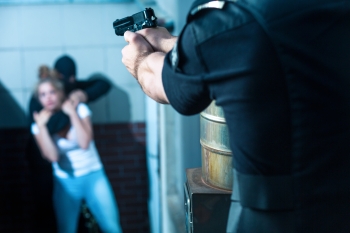
Stress Therapy in Philadelphia: “What is Critical Incident Stress?” Jeffery Mitchell of the University of Maryland, developed the term critical incident stress (CIS) after working with firemen/firewomen and police officers. He defined critical incidents as very dangerous or emotionally trying situations that emergency service personnel must intervene in and causes significant reactions for the emergency service personnel (Lewis 1994:14-15). According to Jeffery Mitchell critical incident stress is a, “a natural reaction of a normal person to an extremely abnormal situation” (2005:15). A critical incident stressor would include being involved in a shooting, finding a rape victim, finding a mutilated body, working with abused children, etc. Most police officers have experienced numerous critical incident stressors throughout their career. Each critical incident stressor will impact an officer differently depending on their personal history, personality and coping mechanisms.
“Are there different types of Critical Incident Stress?” Yes. There are three forms of critical incident stress. Acute CIS often happens at the scene of a critical incident or 12-24 hours after the critical incident. Delayed CIS usually happens if a person attempts to avoid their feelings or reactions to a critical incident. For these individuals critical incident stress occurs 72 hours after the critical incident and can happen suddenly. Cumulative or gradual critical incident stress is commonly known as burnout. It is not triggered by one critical incident but is from numerous events over a long period of time. Jeffery Mitchell considers cumulative or gradual critical incident stress to be the most serious because it tends to have more permanent effects (Lewis 1994:19-20).
“What are some signs of Critical Incident Stress?” When a police officer experiences critical incident stress (CIS), many physical, cognitive and emotional changes occur. Physical symptoms of CIS include fatigue, muscle tremors, sweating or chills, difficulty breathing, gastrointestinal problems, dizziness, nausea, change in appetite, change in sleep and sexual problems. Cognitive symptoms include memory problems including anomia (word loss), difficulty with decisions, confusion and intrusive imagery. Emotional symptoms include anxiety, intense fear, depression, irritability, grief and numbness (Lewis 1994:18). Sometimes the physical, cognitive and emotional symptoms of CIS cause police officers become socially withdrawn. Many police officers will continue to deny the critical incident has affected them in any way despite the distress they may be experiencing (Jones 1989:36).
“I experience Critical Incident Stress often on the job…How do I know if I have become used to Critical Incident Stress? And is this a bad thing?” Becoming used to CIS can be problematic for police officers because of the physical impact on the body. Signs an officer is becoming habituated to high level of arousal include repeated awakenings during sleep, irritability without provocation and difficulty with concentration or memory. Other signs include feeling fatigued even after rest, inability to relax even when not faced with a stressful situation, headache pain, tightness or stiffness and gastrointestinal problems (Blum 2000:141). Once an officer becomes habituated to repeated critical incidents, the officer’s body will release adrenaline into the bloodstream even when an emergency is not imminent (Blum 2000:135). Eventually the endocrine and nervous systems will be compromised which results in lowered immune functioning (2000:140). Gluccocortiods are overproduced as a result of chronic stress and cause fatigue and illness (Anderson et. al. 2002:401).
“I feel burned out…Is that related to Critical Incident Stress?” To briefly explain, burnout is defined as, “a syndrome of emotional exhaustion and cynicism that frequently occurs among individuals who do ‘people work’ and who spend considerable time in close encounters with others who are experiencing chronic tension and stress” (Simpson and Simpson 1997:260). For some officers, the burnout occurs over time and is known as “gradual burnout.” Other officers experience a sudden onset of feeling burnout which is known as “rapid burnout” (1997: 260). Burnout is common among police officers and the effects of critical incident stress influence the burnout process. After the first few years working officers may feel as if their hopes and dreams about the job have been extinguished. Often this is marked by cynicism, resentment and bitterness. Many police officers feel drawn to police work because they want to make a difference, but quickly realize how difficult it is to help people (Madonna 2002:18). As one police officer explained to me, “It is a frustrating career. We are like social workers with guns.” Increasing cynicism is often noted by police officer’s peers, family and friends.
“But my job requires me to deal with Critical Indicent Stress often…What can I do about that?” Addressing CIS can be difficult given that police officers often face CIS, as it is the nature of their work. However there are actions police officers can take to cope with CIS effectively. It is important to recognize the physical, cognitive and emotional signs of CIS. If you recognize CIS signs in yourself it is important that you take care of yourself, for your mental, emotional and physical health, as well as for your career. Self care is especially important in police work and can help police officers cope with CIS and the overall stressors of the job.
Police officers need to engage in healthy coping mechanisms that are effective for them. For police officers, exercise is an excellent positive coping mechanism which reduces depression and anxiety while increasing the body’s natural pain killers known as endorphins. Engaging in a hobby is another positive coping mechanism and has been found to lower tension levels (Blum 2000:172). Social support appears to be extremely important in managing an officer’s stress. One study found that if officers who felt more supported by their co-workers, were more willing to give more energy to their job (Lord 2005:70). Humor is often used by police officers to cope (Ellison 2004:30). Humor can be a very effective and helpful coping mechanism but it can be unhealthy if it is used to escape feelings of vulnerability (Brown 2006).
Be wary of unhealthy coping mechanisms you may be engaging in to cope with CIS. A 2000 study on police officers’ coping behaviors reported that overall officers used poor coping skills which effected the intensity and frequency of experienced occupational stress (Anshel 2000:376). It has been found that roughly 40 percent of officers smoke cigarettes as a negative coping mechanism to deal with the stress (Violanti 2007). Alcohol and drug abuse is a similar negative coping mechanism. Among police officers, alcohol is used for social and bonding purposes and serves as a stress reliever (Martin 1999:124). However social drinking can turn into dependence or abuse. Alcohol abuse contributes to depression and suicidal tendencies because it impairs judgment and increases impulsive behavior (Miller 2006:185).
Share with a close family member or friend about what has been going on. Unless you’re willing to share to some degree about the difficulties you’ve been facing, you’re unlikely to get the support you need and may not realize how much your loved ones care about you. Even if you have a strong social support network, it may be beneficial to receive additional support. Almost all police departments have Employee Assistance Programs (EPAs) that should be able to connect officers to community resources for counseling or other needed services. Talking with a police chaplain or a therapist who is familiar police work and trauma is often helpful.
To speak with one of our stress therapists call at 215-922-5683 Ext. 100 or if you prefer quietly setting yourself up for an appointment, you can self schedule an inperson or virtual codependency therapy appointment. For your convenience we have 5 physical offices and provide virtual therapy services in Florida, Georgia, Pennsylvania, New Jersey, New Mexico and Virginia.
Ocean City Therapy Office
360 West Ave, Floor 1, Ocean City, NJ 08226Mechanicsville Therapy Office
9044 Mann Drive, Mechanicsville Virginia, 23116Society Hill Therapy Office
233 S. 6th Street, C-33, Philadelphia PA 19106Art Museum / Fairmount Therapy Office
2401 Pennsylvania Ave, Suite 1a2, Philadelphia PA 19130Santa Fe Therapy Office, 2204 B Brothers Road, Santa Fe, New Mexico, 87505
Telemedicine: We have therapists who are licensed to work in Florida, Georgia, New Jersey, Virginia New Mexico and Pennsylvania
You deserve the best therapist possible. Our special sauce for helping you achieve your goal, begins with matching you with the right therapist. Check out our GUARANTEE.
Therapy Services Offered:
Individual Counseling and therapy
Couples Counseling and marriage counseling
Teen Therapy and Adolescent Therapy and tweens and child counseling
Family Therapy and multi-generational counseling
Art Therapy and Counseling no art skills needed
ADHD Therapyand ADD, Dyslexia, Autism, Tourettes counseling
Anxiety, Panic, OCD Therapy and worry and fear support
Breaking the cycle of Codependency and being your own person
Overcoming Chronic Illness and Chronic Pain
Depression Therapy and sadness, gloom, and upset support
Grief Therapy and loss, End of A Relationship, rejections, pregnancy loss and therapy
Mindfulness Based Therapy and spirituality based therapy
Sex Therapy and sexual function & dysfunction, sex addiction, sexual orientation and gender identity support
Shame and Blame
Trauma Therapy both emotional and sexual abuse, complex trauma, PTSD counseling
Divorce support
Affairs, Infidelity, Unfaithful, Cheating counseling
Parenting therapy
Personality disorder treatments
Anger Management Therapy
Setting Boundaries and identifying ones own Core Beliefs
Just name some of the Mental Health issues that we work with. Our goal is to help you Change and Achieve Your Dreams


























